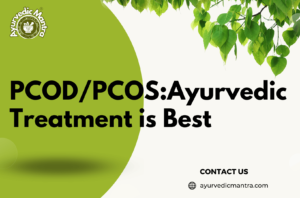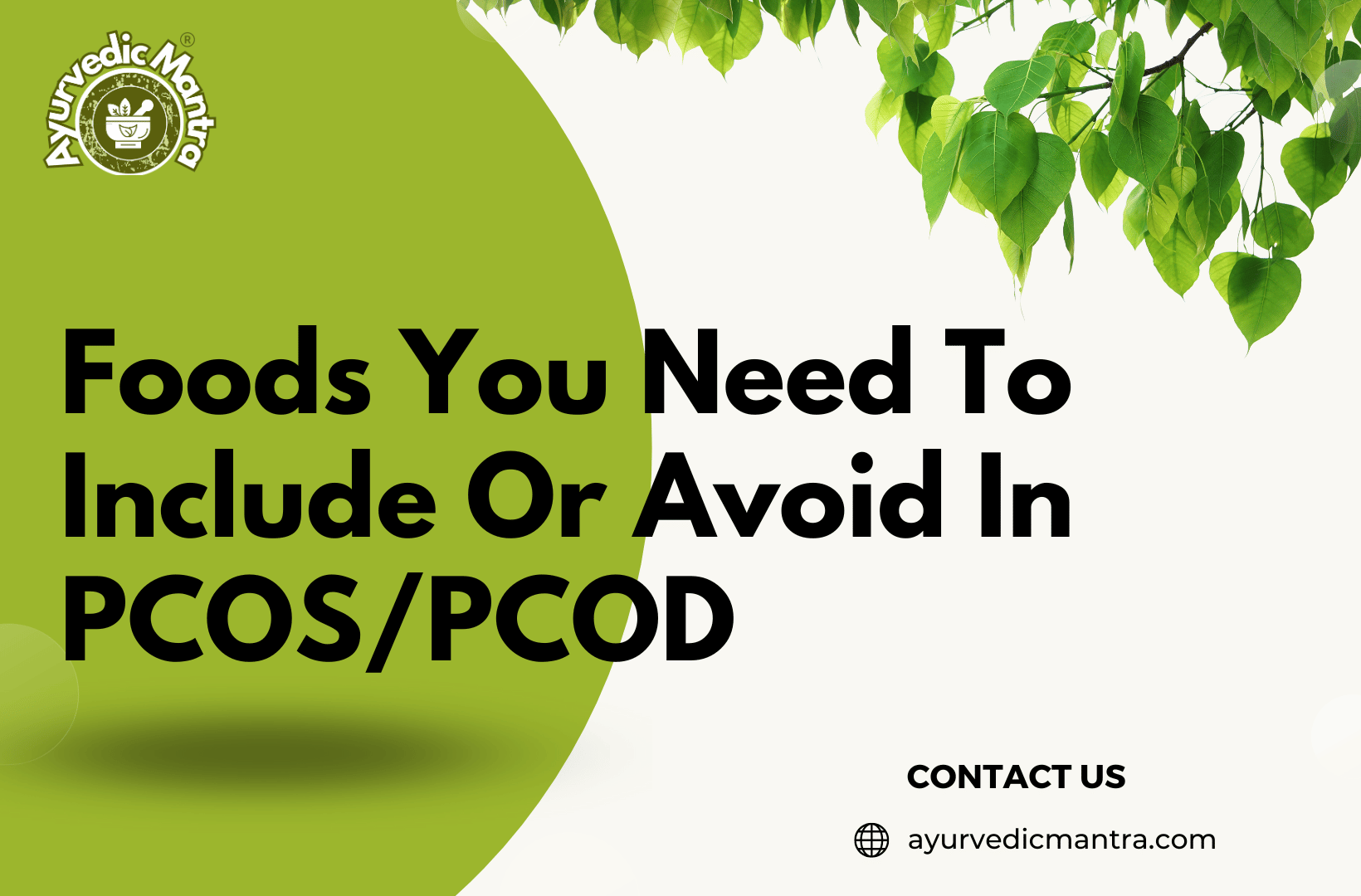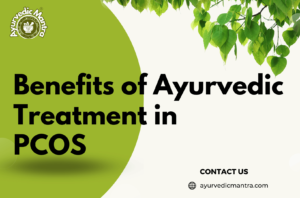
PCOD/PCOS: Ayurvedic Treatment is Best
Introduction Polycystic Ovary Disorder (PCOD) or Polycystic Ovary Syndrome (PCOS) is a common endocrine disorder affecting millions of women worldwide. It leads to hormonal imbalances,


Polycystic Ovary Syndrome (PCOS) and Polycystic Ovary Disorder (PCOD) are common endocrine disorders affecting many women worldwide. These conditions can lead to various health issues, including hormonal imbalances, irregular periods, and difficulty conceiving. While medical intervention is often necessary, dietary choices are crucial in managing the symptoms and promoting overall well-being. In this article, we’ll explore the foods you should consider including and avoiding if you have PCOS/PCOD.
Incorporating lean protein sources such as chicken, turkey, fish, tofu, and legumes into your diet can help stabilize blood sugar levels and promote satiety. Protein-rich foods assist in maintaining muscle mass and preventing insulin spikes, which are essential for managing PCOS/PCOD symptoms.
Opt for whole grains like quinoa, brown rice, and oats instead of refined carbohydrates. Whole grains have a lower glycemic index, so they are digested more slowly, preventing rapid blood sugar spikes. This can contribute to better insulin sensitivity and hormonal balance.
Fiber-rich vegetables like broccoli, spinach, kale, and cauliflower aid digestion, promote fullness and help regulate blood sugar levels. Fiber also supports gut health, which can indirectly impact hormonal function.
Incorporate sources of healthy fats, such as avocados, nuts, seeds, and olive oil, into your diet. These fats support hormone production and overall cellular function. Omega-3 fatty acids in fatty fish like salmon have anti-inflammatory properties and may help reduce PCOS-related inflammation.
Berries, cherries, and other colorful fruits are rich in antioxidants and have anti-inflammatory properties. Chronic inflammation is linked to PCOS symptoms, so consuming these fruits can help mitigate inflammation and oxidative stress.
Cinnamon has been studied for its potential to improve insulin sensitivity and regulate menstrual cycles in women with PCOS. Adding a sprinkle of cinnamon to your meals or beverages may positively affect blood sugar control.
Spearmint and green tea are often recommended for their potential to reduce androgen levels in women with PCOS. Androgens are male hormones that can be elevated in PCOS, contributing to symptoms like acne and excess hair growth.
Foods high in refined carbohydrates, such as sugary snacks, white bread, and beverages, can lead to rapid blood sugar spikes and worsen insulin resistance.
Excess sugar consumption can contribute to weight gain and disrupt hormone balance. Minimize your intake of sugary treats and desserts.
Some women with PCOS may benefit from reducing dairy intake, which can impact insulin levels and contribute to inflammation. Consider dairy alternatives like almond milk or coconut milk.
Processed foods often contain unhealthy trans fats and high sodium levels, which can negatively affect heart health and exacerbate PCOS symptoms.
A high intake of red meat may contribute to inflammation and insulin resistance. Choose lean protein sources instead.
Incorporating a balanced and mindful approach to your diet is crucial when managing PCOS/PCOD symptoms. You can support hormone regulation, insulin sensitivity, and overall well-being by including lean proteins, whole grains, high-fiber vegetables, healthy fats, and anti-inflammatory foods. Additionally, limiting or avoiding foods, such as refined carbohydrates, sugary treats, dairy products, processed foods, and red meat, can further contribute to symptom management. Remember, consulting with a healthcare professional or registered dietitian is essential to create a personalized nutrition plan that addresses your specific needs and goals on your journey to managing PCOS/PCOD effectively.
PCOS, or Polycystic Ovary Syndrome, and PCOD, or Polycystic Ovary Disorder, are hormonal disorders that impact the ovaries’ normal function. They can lead to irregular menstrual cycles and hormonal imbalances, potentially affecting fertility. These conditions may also contribute to symptoms such as acne, excess hair growth, and weight gain due to insulin resistance.
A balanced diet rich in lean proteins, whole grains, high-fiber vegetables, and healthy fats is recommended for managing PCOS/PCOD. Including foods that help stabilize blood sugar levels, regulate hormones, and reduce inflammation can be beneficial. Limiting refined carbohydrates, sugary treats, and processed foods is vital to manage insulin resistance and symptoms.
Yes, making strategic dietary choices can significantly impact PCOS/PCOD symptoms. Foods that help regulate blood sugar levels, reduce inflammation, and support hormone balance can contribute to symptom management and overall well-being.
Insulin resistance is common in PCOS/PCOD and can lead to higher insulin levels in the blood. This can worsen hormonal imbalances and other symptoms. A diet focusing on low-glycemic index foods like whole grains and lean proteins can help improve insulin sensitivity and reduce insulin resistance.
Yes, certain foods can exacerbate PCOS/PCOD symptoms. Refined carbohydrates, sugary treats, and high-sugar beverages can lead to rapid blood sugar spikes and worsen insulin resistance. Dairy products and red meat may also contribute to inflammation and hormonal imbalances in some individuals.
Spearmint and green tea contain compounds that may help reduce androgen levels, often elevated in PCOS/PCOD. Androgens can contribute to symptoms like acne and excess hair growth. While these teas may provide some benefits, they should be considered part of an overall balanced diet and lifestyle approach.
Yes, weight management plays a crucial role in managing PCOS/PCOD. Excess weight can worsen insulin resistance and hormonal imbalances. A balanced diet and regular physical activity can help support weight management and alleviate symptoms.
Certain supplements like inositol, omega-3 fatty acids, and vitamin D have been studied for their potential benefits in managing PCOS/PCOD symptoms. However, it’s essential to consult with a healthcare provider before starting new supplements to ensure they are appropriate for your needs.
Consulting with a registered dietitian or healthcare professional is recommended for creating a personalized diet plan tailored to your specific needs and goals. They can assess your medical history, current dietary habits, and lifestyle factors to develop a plan that supports your PCOS/PCOD management journey.
There is no one-size-fits-all approach to managing PCOS/PCOD through diet. Each individual’s body responds differently to food and lifestyle changes. A personalized approach, guided by healthcare professionals, is essential to address your unique needs and achieve optimal symptom management effectively.

Introduction Polycystic Ovary Disorder (PCOD) or Polycystic Ovary Syndrome (PCOS) is a common endocrine disorder affecting millions of women worldwide. It leads to hormonal imbalances,

Introduction Losing weight is a journey that requires dedication, consistency, and self-care. While there are numerous weight loss techniques out there, not all of them

Polycystic Ovary Syndrome (PCOS) is a hormonal disorder that affects millions of women worldwide. It can lead to various health complications, such as irregular periods,

In recent years, Ayurveda, an ancient system of natural healing originating from India, has gained significant popularity as an alternative approach to treating various health

आजकल वजन बढ़ने और चर्बी की वृद्धि होने की समस्या एक आम समस्या बन गई है। बढ़ते वजन और अतिरिक्त चर्बी के कारण न केवल

प्रस्तावना: आजकल वजन बढ़ने और ओबेसिटी की समस्या एक आम समस्या बन गई है। बढ़ते वजन के कारण न केवल शारीरिक समस्याएं होती हैं, बल्कि
